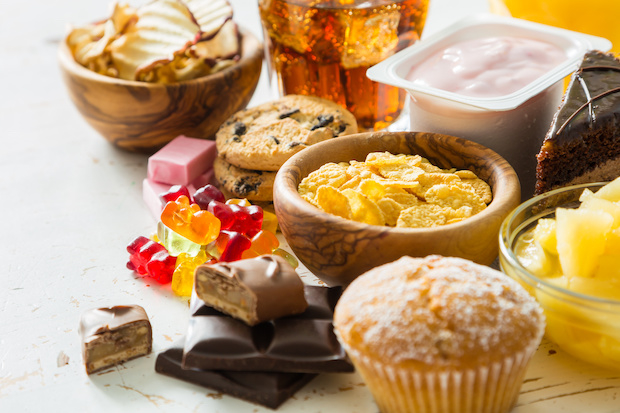Processed Food Perfection

“Processed foods are bad for you.” It’s a phrase spoken frequently by healthcare providers, influencers, and family members, to the extent that most people wouldn’t bat an eye upon hearing it. Most of us are in continuous pursuit of health and, for those in sport, performance. But are processed foods bad for you? Should you avoid them? Is “real food” a better option than processed food? And specifically, is it better to fuel exercise with “real food”? I think we need to talk about it. Because for me, this “avoid processed food” phrase brings about some serious cringe.
It’s important to define what constitutes a processed food before passing judgment on them. There’s a range of refinement on our supermarket shelves. The NOVA classification system breaks down foods into four categories:
Unprocessed or Minimally Processed Foods: Foods that are sold exactly as they are found in nature, or foods that have undergone minimal processing such as cleaning, removal of inedible parts, shelling, grinding, pasteurization, cooling, etc.. Nothing else has been added to these foods. Examples include eggs, nuts, fresh fruits, or potatoes.
Processed Culinary Ingredients: Products extracted from natural foods to make other products, such as seed oils, cane sugar, maple syrup, or corn starch.
Processed Foods: Manufactured foods with the addition of salt, sugar, fat to preserve them or make them more palatable. Often these are made with processed culinary ingredients. They’re derived directly from foods and considered original foods. Examples: fresh bread, cheese, tomato paste, or bacon.
Ultra Processed Foods: These are industrial formulated foods, sometimes with flavor additives, colors. Examples include: breakfast cereals, cakes, granola bars, sports drinks and gels, or pre prepared frozen pizzas.
So, let’s talk about sports fueling specifically. When it comes to fueling, there’s lots of nutrition options out there: sports drinks, gels, waffles. By our classification system, these items are considered ultra-processed foods. But there’s also less processed foods that people swear by like bananas, dates, rice cakes, honey, or maple syrup. So what are the positive and negative characteristics of both?
The benefits of “real food” fueling like using bananas or dried fruits is that they contain carbs, which are essential for providing energy, but also vitamins, minerals, and phytonutrients. These nutrients are essential to good health, and generally have been removed from sports products. Most people aren’t going to argue these foods are bad for you. The downside to “real food” fueling, is that these foods are often higher in fiber, which is, again, great for health, but may be a detriment to quick digestion and may cause gastrointestinal distress during exercise.
Meanwhile products like gels, drinks, and chews, are primarily made of up simple sugars and (sometimes) electrolytes. Most sports nutrition products are ultra-processed foods, giving you exactly what you need, pure energy-laden goodness, with everything else removed. It’s what these products have been designed to do. The limited fiber won’t slow down digestion. They’re easy to carry, easy to take in, and deliver on what they are: quick simple energy. Are you getting the same vitamins, minerals, and phytochemicals that are in natural foods? No. Do you need these nutrients in the middle of training? Also no, as long as they’re included in other meals and snacks of the day.
So which one is better? That’s really about personal preference.
I think one thing that amuses me is the demonization of processed foods. The association of morality with choosing less processed foods when they really just may be more convenient, more affordable, or more tolerable. There's also many misconceptions of what’s considered a processed food. Oatmeal which is hulled, smashed, and cut, is a processed food. Precut bagged salad is a processed food. Yogurt is a processed food. Foods that are canned, frozen, or dehydrated in manufacturing to become shelf stable still provide the same (or better) nutrients as their fresh food counterparts. So to generally say processed foods are bad for us feels like a bit of an overstep.
Nuance is important here. I’m not saying that people should solely consume ultra-processed foods. Imagine only eating sports gels or fast food all day, every day. The lack of fiber alone would surely cause some discomfort. Now again, imagine only eating raw, unprocessed foods all day, every day. The amount of fiber alone would surely cause some discomfort. Not to mention, the additional time that’s needed to prepare unprocessed foods. I’m saying the judgement around eating processed foods is unnecessary. In many cases, like sports products, ultra-processed foods can have their place in a healthy diet.
So how do you choose what is right for you? In training, I think the most important piece here is that fueled is best. It doesn’t matter what you use, as long as you use something and give your body energy when it needs it. Next comes down to personal preference, tolerability, and affordability. If you’re just trying to tolerate eating while exercising, start with foods that are easier to get in i.e. sports drinks and gels. Fruit snacks are another good option that may be easy to get down and affordable. As intensity increases, so often does the need for more simple-sugar fueling strategies. Once you’re getting in enough food, or doing lower intensity exercise, you can experiment with different foods. Applesauce packets, homemade rice cakes, baked goods, dates, or sweet potato bites are all good choices. Sometimes an old fashioned peanut butter and jelly sandwich hits the spot on a long ride. If it’s primarily carbs and tastes good, it’s probably a good option.







Start the discussion at forum.slowtwitch.com